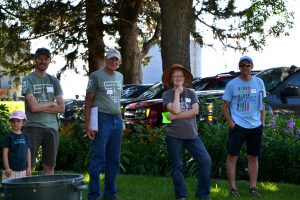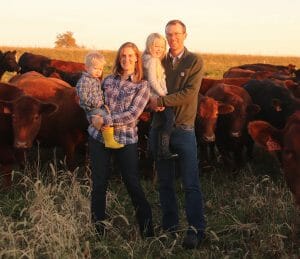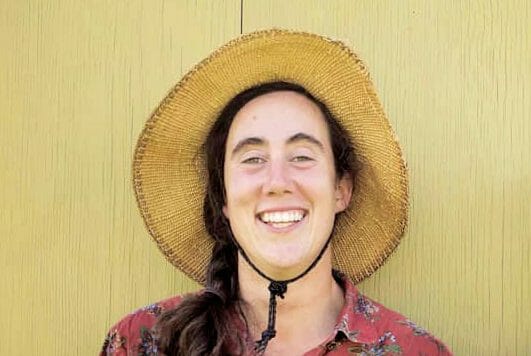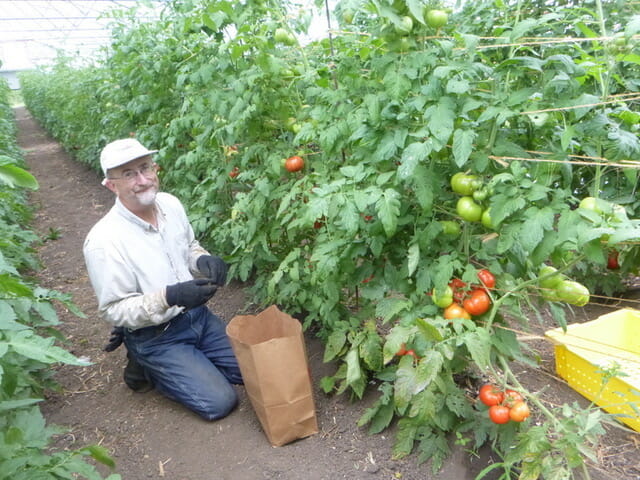Cooperative Research Builds Community
Practical Farmers’ Cooperators’ Program involves a community of curious and creative farmers taking a scientific approach to improving their farms. Since 1987, when the program began, farmers have been conducting timely and relevant on-farm research to answer their most challenging farming questions. Knowledge generated from these trials has been shared widely and continues to inform farmers on ways they can be more profitable, better environmental stewards and, ultimately, make their farms more resilient.
Those who participate in on-farm research will tell you it involves a high level of dedication and commitment. This perseverance pays off, however, when participants get to see the results of their research – and when they have a chance to network with others. Each year, cooperators gather in December to share results and observations from their trials, and to make plans for future projects. Often, high-quality conversation emerges. This sharing of ideas and perspectives is one of the main reasons why farmers so highly value the annual Cooperators’ Meeting.
Learning from others at the Cooperators’ Meeting is a primary motivation to participate.
The Cooperators’ Meeting is a farmers’ meeting – each farmer is expected to stand up and describe what they did, why they did it and what they found. In this sense, farmers truly own their trials. During this meeting, cooperators generate new ideas and design timely and relevant trials to address their most pressing farming questions. Many consider the meeting a reward for the hard work put into research efforts during the year. Here are just a few of the responses we’ve received from evaluations of recent meetings:
I conduct on-farm trials because it gets me to the Cooperators’ Meeting and the opportunity to intimately connect with other farmers – both farmers who farm like me and those who have totally different operations than I do.
My biggest motivation for attending the Cooperators’ Meeting every year is knowing that there will be an opportunity to connect with other farmers who have a similar method to approaching questions and challenges on their farms. More than just learning from other farmers and sharing research with other farmers, I feel like my reason for attending is about the discussion and connection.
I really like the opportunity to catch up with farmers in other parts of the state, and not just those in my region who I have the opportunity to see more often.
Projects are often collaborative efforts among several farmers influencing one another and committing to an experiment together. Projects are also inspired by what we’ve begun calling “cross-pollination,” which occurs when field crop, livestock and horticulture farmers interact and mingle together. When farmers integrate this way, new perspectives emerge and the whole farming landscape is considered, along with different ways of farming. In recent years, participants have heralded these cross-pollination sessions as among their favorite activities at the Cooperators’ Meeting, because the resulting sense of fellowship and community inspires confidence to try new things. And trying new things by conducting on-farm research is precisely why PFI’s Cooperators’ Program exists.
Discussion and good conversation are important elements of the Cooperators’ Program. But are the attendees making the jump to actually running trials? Are cooperators finding answers that can help them be more profitable? Are the trials moving the needle on sustainable agricultural production among PFI farmers? Among farmers outside PFI? These are some of the questions cooperators think are important when considering the future of farming and agriculture in Iowa. With each trial cooperators plan and conduct, these questions are never far from mind – and it’s these aims they hope to impress on other farmers and potential cooperators.
We spoke to a few dedicated farmer-cooperators to find out how they first connected with the Cooperators’ Program, how it has benefitted them and why they remain so committed to on-farm research.
Dave Schmidt
Dave and Meg Schmidt raise cattle, pigs, sheep, chicken and honeybees on their farm, Troublesome Creek Cattle Company, near Exira, Iowa. They have been a part of the Cooperators’ Program since 2011 and have completed 22 trials. Their research interests include grazing cover crops and cover crop varieties, and monitoring cattle pasture activity, fly control strategies, winter feed management and the fatty acid composition of 100% grass-fed beef.
Can you describe what it was like attending your first Cooperators’ Meeting?
I think my first Cooperators’ Meeting was in February of 2011, but I can’t say I really remember that one. The earliest one I do remember was in February of 2012. I presented on the results of the 2011 pasture monitoring project and the winter feed monitoring project. At that time, I was only a few years removed from my time collecting and analyzing wildfire data in the Sierra Nevada, so I was really excited to be applying similar methods to my own data.
[During the 2013 meeting,] Meg and I had trouble with our Jeep in the parking lot. [Former PFI staff member] Luke Gran drove up with [PFI co-founder] Dick Thompson and gave us a ride to the meeting place. Meg remembers sitting near Lorna Wilson – whom she didn’t know at the time – who was knitting furiously and said she was expecting a new grandchild at any moment. Since that time, we’ve gotten to be good friends with the whole Wilson clan.
How has the Cooperators’ Program influenced you, your farm or relationships with other PFI members?
For several years after I started raising cattle, it was really hard not to feel like I needed to be monitoring everything. I was probably a little naive and over-enthusiastic, but the Cooperators’ Program helped me focus that energy more usefully. I think I have finally given up on expecting black-and-white results from biological trials, at least with livestock. However, no matter the results, I think the process of monitoring – plus collecting and analyzing – data can’t help but make the participant a better farmer.
I think the research and results are important, but what really matters is the people and those connections. Meg and I really enjoy going to the livestock sessions of the Cooperators’ Meeting because it’s a smaller group of people we know well and with whom we look forward to comparing notes. There are almost always a few new people that we like getting to know too. The enthusiasm of other cooperators, such as Jon Bakehouse, is infectious and I’ve enjoyed discussing various questions with him for quite a few years now.
Being a cooperator is a commitment. What makes it worthwhile?
To me, at least, the Cooperators’ Program is the heart of PFI. When you participate as a cooperator, you have the opportunity to not only improve yourself and your farm management, but maybe also pass on some invaluable knowledge to someone who might have had the same questions as you. Some of the early trials we did gave us a solid baseline for understanding our management options so that now we don’t have to question as much every single decision we make.
What would you say to someone who might be interested in becoming a cooperator?
Do it! Don’t be intimidated – you don’t need to be a scientist and you don’t need to be able to analyze the data. Several years ago, I remember Stefan Gailans and Sarah Carlson asking me when I was going to try a cover crops trial. I didn’t really know anything about cover crops and was horrified at the idea of participating as an inexperienced outsider. Meg and I ended up jumping in; we learned a lot and were able to contribute to an interesting study in the process.
PFI will help you design the methods, analyze the data and summarize the results. At best, you will contribute to the knowledge of many others who read the research results and also improve your own farm management. At worst, you will learn how to do a better job systematically collecting and recording data for the next project. And maybe you’ll get to make some new friends along the way.
Emily Fagan
Emily Fagan raises organic vegetables at Humble Hands Harvest in Decorah, Iowa, with her cousin, Hannah Breckbill. They sell produce to local restaurants, at farmers markets and through a CSA. Emily has been part of the Cooperators’ Program since 2019, and has completed five trials. Emily’s first trials were a cabbage variety trial and sweet potato enterprise budget. In 2020, Emily and Hannah continued the cabbage variety trial, added a spinach variety trial and compared potting soils for transplant suitability.
Can you describe what it was like attending your first Cooperators’ Meeting?
My first meeting was really fun. I went in without any clear research question, mostly just wanted to see what it was like and see what everyone else was interested in, how trials were organized, etc. I expected to be a little intimidated, but turned out not to be – a room full of curious vegetable farmers is always a good room to be in!
How has the Cooperators’ Program influenced you, your farm or relationships with other PFI members?
I do see a difference in myself. I’m more inclined to follow through with questions or new ideas I have, and be organized about testing them out. I’m always thinking, “it would be interesting to see if this new method might be better. I wonder if I could do a trial for it?” The Cooperators’ Program gives me an outlet for my nerdy, data-loving self, which I really enjoy.
It has also given me a deeper sense of connection with the other veggie farmers in PFI, and that team kind of feeling is really motivating for me. The feeling of being trusted to collect good data and have interesting ideas is empowering. Though we don’t see each other during the season, usually, I still feel connected to the folks I’m doing a trial with. It’s comforting to know that there are other folks out there doing the same work as I am, with the same passion.
Being a cooperator is a commitment. What makes it worthwhile?
It’s worth it to me because I know that the work I put in will be useful to other farmers. There isn’t as much information about growing vegetables out there as there could be, and I like to think that the work of this program can help ease the way for other folks.
What would you say to someone who might be interested in becoming a cooperator?
I would say come to a meeting and try it out! Even if you don’t have a trial in mind, the curiosity in the room is contagious and it’s really fun to listen to people’s ideas and learn how trials are implemented.
Dan Wilson
Dan Wilson farms with his family at Seven Wilson Farm near Paullina, Iowa. Their 660-acre diversified farm includes organic corn, soybeans, hay and a variety of small grains; an organic dairy, grass-fed beef herd, sheep flock, pasture-raised broilers and laying hens; and farrow-to-finish hogs. Dan has been a part of the Cooperators’ Program since 1994 and has completed 16 trials over the years. Dan’s research interests have explored the efficacy of twin-row ridge planters, the value of composting bedding-manure mix from swine hoophouses, barley as an alternative to corn in swine grower-finish rations and soil quality indicators.

From left to right: Dan Wilson, Lorna Wilson, and Torray Wilson at the 2018 field day their family hosted
How did you get involved with the Cooperators’ Program?
My brother, Colin, and I had just taken over the farm from my father in the late 1980s. We had just switched over to ridge-till when our good friend, Paul Mugge, told us we should join PFI. We were not that involved with the Cooperators’ Program at first, since our real focus was on livestock instead of row crops. But it didn’t take too long until PFI was doing research on using small grains in swine rations [and we became more involved]. We were growing barley at that time and were trying to figure out the best way to use the most barley in our swine rations.
How has the Cooperators’ Program influenced you, your farm or relationships with other PFI members?
Through the Cooperators’ Program, we have developed much closer relationships with other cooperators, which has developed into a trust that I don’t think would be there if it weren’t for the time and conversation that was involved with the program. By being involved with the Cooperators’ Program, I feel I have become much more open to different ideas. I think one of the great aspects of the Cooperators’ Program is that it keeps evolving as farming and the people involved keep changing.
Being a cooperator is a commitment. What makes it worthwhile?
The answers you gain and the friendships you make are worth all the commitment it takes to be involved with the program.
What would you say to someone who might be interested in becoming a cooperator?
I would say to anyone that is interested in becoming a cooperator to go for it. The rewards are much greater than the commitment.
Jan Libbey and Tim Landgraf
Lifetime members Jan Libbey and Tim Landgraf raise vegetables and pastured poultry at One Step at a Time Garden in Kanawha, Iowa. They have been part of the Cooperators’ Program since 1999 and have conducted 17 trials. Their research has looked at the effect of pastured-raised poultry on nutrient content; aster yellows, a disease of garlic; and energy used during seed starting. Jan and Tim have also collected fruit and vegetable production data to create production histories specific to Iowa, and conducted multiple enterprise budgets.
How did you get involved with the Cooperators’ Program?
Jan: Our involvement began with a conversation with Rick [Exner, who managed PFI’s on-farm research program for many years]. We were trying to figure out what type of project would work best for our farm. For instance, in the beginning we were being labeled as hobby farmers, which we are not. We are hort farmers, so the language had to evolve over time. We were early on with our farming when we began. We had about 50 types of vegetables then and did not need much planting space, so variety trials did not really make sense.
Tim: The issue in the beginning [was that] PFI was doing a lot of replicated trials with row crops, which worked really well with row crops. But with CSA production, [we] only had so much feet of each crop. So it was hard to figure out what would work best with vegetables to create a replicated trial.
Jan: We came across a study from Minnesota that looked into standardizing analyses of farming economic benefits. Between Rick and us, we were able to compare the results from our farm with data from other farms. There was a lot of potential to figure out the best process for our farm. In late 2002, Tim actually quit his off-farm job based on the results of the study in 1999 on the CSA farming economic benefits in order to farm full-time.
How has the Cooperators’ Program influenced you, your farm or relationships with other PFI members?
Tim: By participating in studies with other farmers, you are able to get to know other farmers better. You get to learn about their operations. You really get to understand who people are as individuals. At the annual conference, [where the Cooperators’ Meeting took place in the early years], we would first start out as a big group and then meet into little groups afterwards with just your hort group, livestock group, row crop group. Then we would come together and discuss what we are all interested in. It’s fascinating to hear about what other groups are interested in.
Jan: By participating in this program, it has seeped into our way of viewing our farm and the way we think – which is why it is hard to articulate. I feel this characteristic of looking at one’s farm through a critical, analytical lens is pretty common among farmers drawn to PFI or influenced by PFI programming and networking. That’s one of the reasons I find PFI, and especially the Cooperators’ Program, so energizing. The curiosity factor is strong and supported.
Being a cooperator is a commitment. What makes it worthwhile?
Tim: If you ask good questions at the beginning, take the time to make the data consistent and accurate. If you take the time to do things right, you will often find that you will learn something about your farm practices. This is something I really wanted to know. Then you can learn from the data. It’s also very helpful when other farmers are interested in the same question – then you can compare across Iowa. It brings more purpose to the farm.
What would you say to someone who might be interested in becoming a cooperator?
Jan: It is a great place for creative energy. These are some of the smartest farmers in the state. It is very inspiring. Even if you don’t come away with new information, it gives you hope.
Find out more about farmer-led research and the PFI Cooperators’ Program here





